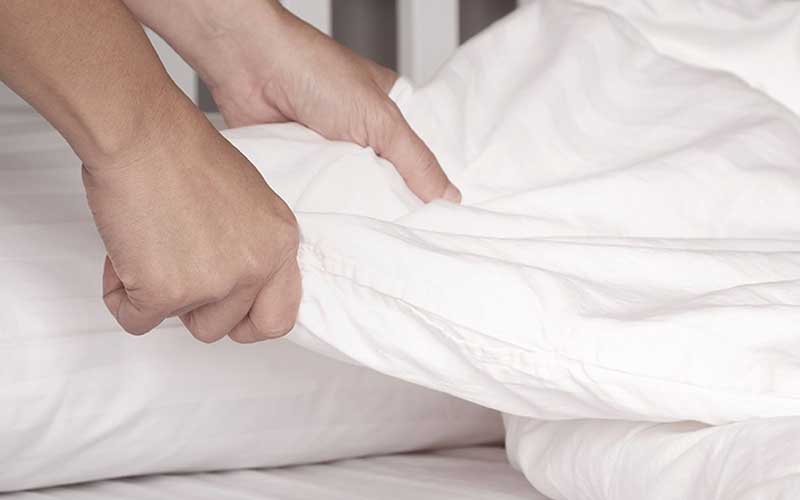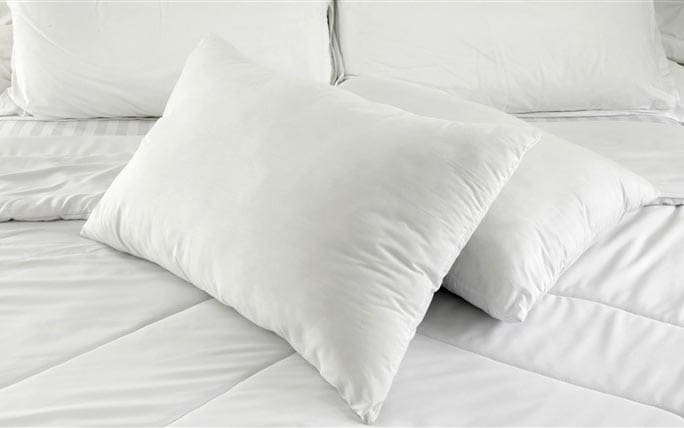Most people typically spend between 40 and 60+ hours sleeping in their beds, during which their sheets and bedding accumulate dirt, sweat, oil, dead skin cells, and other debris. Proper bedding hygiene is crucial, just like any other aspect of our lives, especially for the quality of our sleep.
Neglecting to clean your sheets regularly can lead to allergies, skin breakouts, asthma, and other health issues that your body will have to endure. If you’re unsure how frequently you should launder your bedding, you’ve come to the right place!
[toc]

How often should you wash your sheets?
Keeping your sheets clean is important to maintaining good hygiene and ensuring a good night’s sleep. But how often should you wash your sheets in British English?
Experts suggest you aim to wash your sheets at least once a week. This is because, during the week, our sheets can accumulate a lot of sweat, dead skin cells, and other debris, creating an unhygienic sleeping environment.
However, if you have allergies or sensitive skin, you may want to wash your sheets more frequently, such as every 3-4 days. On the other hand, if you live in a cooler climate and don’t sweat much, you may be able to stretch the time between washes to 10-14 days.
It’s important to note that pillows, duvets, and mattress protectors should also be washed regularly to maintain a clean and healthy sleeping environment. By washing your bedding frequently, you can ensure you get a good night’s sleep and reduce your risk of allergies and other health issues.
How to wash your bedsheets?

Washing your bed sheets regularly is essential for maintaining good hygiene and prolonging their lifespan. Here’s how to wash your bed sheets in a washing machine:
- Read the care label: Check the care label on your sheets to determine the appropriate water temperature and wash cycle. This will help ensure that your sheets are washed properly and don’t get damaged.
- Sort your sheets: Sort your sheets by colour and fabric type. Wash whites separately from colours to prevent colour bleeding—separate delicate fabrics from heavy fabrics to prevent damage.
- Pre-treat stains: If you have any stains on your sheets, pre-treat them before washing them. Apply a small amount of detergent to the stain and let it sit for a few minutes before washing.
- Add detergent: Add the appropriate amount of detergent to the washing machine. Use a mild, fragrance-free detergent if you have sensitive skin.
- Wash on a gentle cycle: Select the gentle cycle on your washing machine to prevent damage to your sheets. Use cold or warm water, depending on the care label instructions.
- Dry properly: Once the washing cycle is complete, remove your sheets from the washing machine and hang them to dry, if possible. If using a dryer, choose a low heat setting to prevent shrinkage or damage to your sheets.
- Iron or fold: Once dry, iron your sheets on a low heat setting to remove wrinkles. Alternatively, you can fold them neatly and store them in a dry, clean place until you’re ready to use them again.
Following these steps, you can keep your bed sheets clean, fresh, and hygienic for a comfortable night’s sleep.
What to choose when washing your sheets in the washing machine?
When it comes to washing bed sheets in a washing machine, it’s important to choose the right setting to ensure that your sheets are cleaned properly without being damaged. Here’s what setting to use to wash bed sheets in a washing machine:
- Select a gentle cycle: For most bed sheets, it’s best to choose a gentle cycle to prevent damage to the fabric. This is especially important for delicate fabrics such as silk or linen. Some washing machines have a specific setting for bedding or delicate items.
- Use cold or warm water: It’s generally recommended to use cold or warm water when washing bed sheets, as hot water can damage the fabric and cause shrinkage. However, follow those instructions if the care label specifies a warmer temperature.
- Use a mild detergent: Choose a mild, fragrance-free detergent to avoid irritating your skin or causing allergic reactions. Be careful not to use too much detergent, as this can leave a residue on your sheets.
- Don’t overload the machine: Avoid overloading the washing machine, as this can prevent the sheets from properly cleaning and rinsing.
- Rinse thoroughly: Make sure to rinse your sheets thoroughly to remove all traces of detergent.
Following these guidelines, you can wash your bed sheets properly and maintain their quality and durability.
What are the risks of sleeping on unwashed sheets?

When sleeping on dirty sheets night after night, the consequences can range from skin irritation to bigger health issues. Those dead skin cells form a sort of food for dust mites, tiny invisible insects that thrive on mattresses, bedding, furniture, and carpets. Dust mite droppings are a major allergen and can trigger many irritations, including asthma, hay fever and eczema. This is why it’s so important to clean your sheets regularly!
Moreover, dust mites in the home can indicate that your sheets are too dirty, even if they may not look this way at first. Those pellets of dust mites increase with dirtier sheets and a long time without washing them – something that could become quite apparent when you attempt to wipe away the visible dust with little success. It’s best practice to keep your sheets clean as often as possible to avoid these issues by all means!
How often you should wash other bedding?
- Ensure that you wash your duvets at least twice a year.
- Wash your pillows every three months.
- Wash your mattress protectors every two months.
- Clean your mattress every couple of months.
How to keep my sheets and bedding fresh longer?
Don’t make your bed every morning
Although making your bed every morning might give you a sense of accomplishment, it also has unexpected health consequences. One main reason not to make up your bed as soon as you get out of it is that you generate sweat while sleeping. Making the bed immediately can trap this moisture and warmth in the duvet, encouraging dust mites to take up residence. As everyone knows, these little buggers are difficult to remove after they settle in without extensive cleaning – or just leaving your sheets unmade!
In addition to foregoing the usual being-a-neatnik routine, another way to reduce dust mites – mould growth and other allergens – is to keep bedrooms well-ventilated. Opening windows in the mornings whenever possible helps disperse moisture and encourages good airflow into your room. While some people may find an unmade bed unsightly, taking care of the hidden dangers lurking beneath is well worth sacrificing a neat presentation for a healthier night’s sleep.
Avoid eating in bed
Eating in bed can add some much-needed comfort to our leisurely day-offs and late-night snacking, but it’s an unhealthy habit. Eating in bed ties into the larger issue of consistently maintaining a clean and sanitary bedroom environment. Not only the presence of food particles could attract the growth of germs and bacteria, but they could also invite pests such as cockroaches, bugs, ants and other vermin, which are harmful to our overall health.
Beyond inviting unwanted germs, eating in bed is unpleasant for a nice night’s sleep; think about all those crumbs tucked inside your comfy sheets! Even if you think you are managing to keep things tidy by wiping up your spills after eating or drinking in bed, these crumbs will accumulate over time, making your sleep experience thus far from ideal. This practice speaks nothing of hygiene standards and may lead to asthma attacks and complicated health issues.
Shower before bed
Take a shower or bath before bed to remove dirt and sweat from your body. This will help prevent dirt and sweat from transferring onto your sheets. Wash your hands before bed to prevent germs and bacteria from transferring onto your sheets.
Wear clean sleepwear
Wear clean sleepwear to bed to prevent dirt and sweat from transferring onto your sheets.
Bottom line
Most people live a busy and fast passed life, which is why spending a few hours cleaning your bedding every week might seem too time-consuming. But just like, we wash the clothes we wear (most of us do, anyway), we have to keep our sheets and bed linen fresh and clean.
Having good sleep hygiene will improve your sleep quality and better your allergies (if you have any). No matter what sort of bedding you have, your top priority is to keep it clean and dust-mite free! If you think we missed something on the subject or if you have any questions and concerns, please drop us a line in the comments below, and we’d try to respond as soon as possible!

